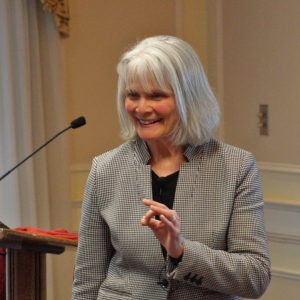 We had the opportunity to talk with Dr. Susan Wehry, Chief of Geriatric Division of Primary Care for the School of Osteopathic Medicine at University of New England prior to her presentation at The Cedars Annual Meeting on May 2.
We had the opportunity to talk with Dr. Susan Wehry, Chief of Geriatric Division of Primary Care for the School of Osteopathic Medicine at University of New England prior to her presentation at The Cedars Annual Meeting on May 2.
It’s an interesting time with so few people going into geriatric medicine and the number of older adults rising every day. What is your goal and vision in your role at UNE?
Whether future physicians want to go into geriatric medicine or not, they are going to be treating a lot of older adults because that’s who’s here. They’ll be working with older adults in orthopedics, primary care, gastroenterology, or even pediatrics – since many grandparents will be caring for their grandchildren.
My goal isn’t to create more geriatricians – that situation will take care of itself. Rather, my goal is to ensure that tomorrow’s physicians will know how to care for this population. For instance, polypharmacy is a huge issue with something like 80% of emergency room visits resulting from adverse drug reactions. I will hopefully inspire a handful of students to become geriatricians, however I really want each student to think critically about every older person they see.
Secondly, I want to inspire physicians to get involved in public policy. The current health care system is not serving people well, as we see in the high burnout rate for health care professionals, the fact that we’re barely containing costs, the inadequate access to care, and disparities among people of color and the poor. We need to critically think about how to make the systems better – and to make it an age-friendly system.
As a geriatric psychologist, I find the workings of the brain to be fascinating and a rich area for exploration in old age. If we could influence dementia care, delirium, depression and anxiety – we would see much less suffering and the world would be a better place.
The Cedars is enthused to be a research partner with UNE medical school in our Opening Minds through Art (OMA) program. Tell us about the study through Scripps Gerontology.
In long-term care, we need to continue finding ways to put the person in the center of care. It used to be that we looked at dementia from the outside, inward. Then we looked at the person with dementia, and now our care interventions need to concentrate on the whole person. Although ‘dementia’ is big, it’s not the person. Individuals with dementia still have ways of expressing themselves and communicating, even if they can’t speak or use their hands. Art is a non-verbal pathway for communication.
My hope for involving the medical students in OMA, is to open other channels of communication, to make a person-to-person connection, to see the person not as their symptoms but as an individual, and finally to build empathy skills in general. We need to look at dementia in a new way, moving from a deficit model to a strength-based approach. We don’t want to focus on working with what’s wrong, but instead to work with what is!
In terms of the study, it’s clear that medical students won’t be able to participate in the full, 13-week course. Therefore, we’re trying to determine what is needed from the program to reach our goals for the students. We’ll look at three groups: one will take a pre-test followed by the OMA online training and then a post-test; another will take a pre-test, work with a long-term care resident for one day in the program, then a post-test; and the third will only take the pre and post-tests.
The Cedars has a long history as a clinical site for UNE’s medical and health students. Tell us why you chose The Cedars for this study, aside from our history and the fact that we are an OMA community.
The fact that The Cedars is near our Portland campus and that we’re in the same community, is a great starting point. In addition, you have Angie Hunt who is always thinking and seeing opportunities. When I met Angie and Kathy Callnan, where we all presented at the University of Maine’s Clinical Geriatrics Colloquium, I was so impressed by their fundamental commitment to person- centered care and their plans for the Household Model of care. The Cedars has a proven track record of innovative programs and making things happen; it’s always great to find a partner who shares your values and brings their own great ideas.
